Key points:
- United Methodist and other Christian clergy joined together at the Tennessee State Capitol to speak out for gun-control legislation in the wake of the recent school shooting in Nashville.
- They also spoke out against the removal of three state representatives, who are being threatened with expulsion after leading a chant in the house chamber in favor of gun control.
- The clergy also plan to hold a prayer service outside the Capitol ahead of the vote on the three representatives’ status on April 6.
Beneath a bronze bas-relief celebrating women’s right to vote, some 60 United Methodist and fellow Christian clergy called on Tennessee legislators to vote for gun-control legislation and against the expulsion of three state representatives.
“Will you continue to allow the gun to be the golden calf of our age?” said the Rev. Shelby Slowey, pastor of South End United Methodist Church in Nashville. “As pastors and Christians, we are begging you to choose peace, both on the house floor and in our streets.”
Slowey, who is the mother of three young children, was among the clergy who led a quickly organized press conference at the Tennessee State Capitol to urge immediate action in the wake of last week’s mass shooting at Nashville’s Covenant School. The shooter claimed the lives of three 9-year-old children and three adult staff members within 15 minutes before being taken down by police.
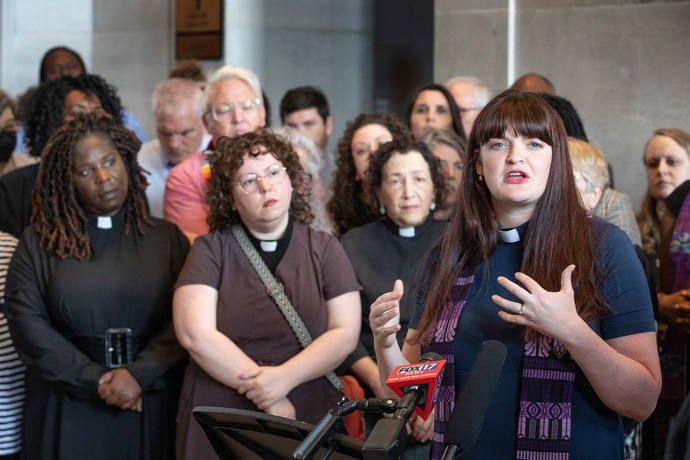
Immediately after last week’s violence, nearby United Methodist churches held prayer vigils and reached out to grieving families. Calvary United Methodist Church also hosted a session with a psychologist on how to help kids traumatized by gun violence. Now, many of those same clergy, amid their Holy Week preparations, were joining their prayers with advocacy.
Several speakers noted that firearms are now the No. 1 cause of death for children and teens in the United States, surpassing motor vehicle deaths and those caused by other injuries.
The Rev. Byron Ward, pastor of Greater Bethel African Methodist Episcopal in Nashville, said he was among a group of Black pastors who last year pushed for the state to designate gun violence a public health issue. That effort came to no avail.
“We stand in halls of legislators who say they are pro-life,” he said. “Somebody needs to tell them that life extends beyond the womb. You cannot consider yourself pro-life if you do not care about the child once it is born.”
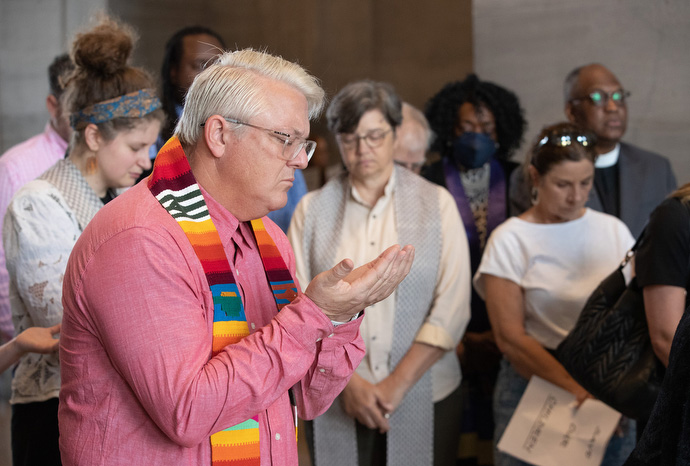
Adding to the clergy’s sense of urgency is the scheduled vote on April 6 on the possible expulsion of three state representatives for “disorderly behavior.” The three — Reps. Gloria Johnson (Knoxville), Justin Pearson (Memphis) and Justin Jones (Nashville) — interrupted proceedings on March 30 to lead chants for gun reform from the house floor. They said their hope was to speak up for the teens and others protesting outside in favor of gun control. Jones is a United Methodist who studied at Vanderbilt Divinity School in Nashville.
The vote on April 6 is supposed to be only a preliminary step in a process that also includes an opportunity for the representatives to defend themselves. But as of April 3, the three representatives’ badge access to the state house’s office building and parking had been shut off. The three also were stripped of their committee assignments.
Crucially, Slowey emphasized, removing three duly elected representatives would remove the voices of their 200,000 constituents.
“But we will not be silenced,” she added to cheers. “We will keep making our voices heard along with the voices of the people because that’s what our children deserve.”
The clergy have scheduled a time of prayer outside the Capitol on April 6 ahead of the vote on the three representatives’ status.
After the press conference, some of the clergy joined in a sit-in outside House Speaker Cameron Sexton’s office. Sexton is among those pushing for both a delay in consideration of gun control until next year and the removal of the representatives. He eventually did come out to meet with the clergy.
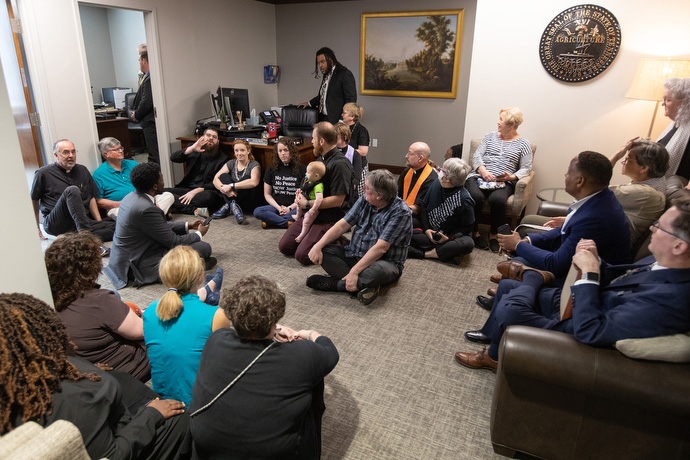
However, the Rev. Ingrid McIntyre, a United Methodist pastor and one of the main organizers of the press conference, said he did not listen to their concerns about gun reform and democratic representation.
She sees the push of gun reform to the next year as dangerous and designed to sap advocates’ energy.
“We need to keep the gas on; we need to not take our foot off the pedal,” she told her fellow clergy ahead of the press conference. “And we need to keep pushing.”
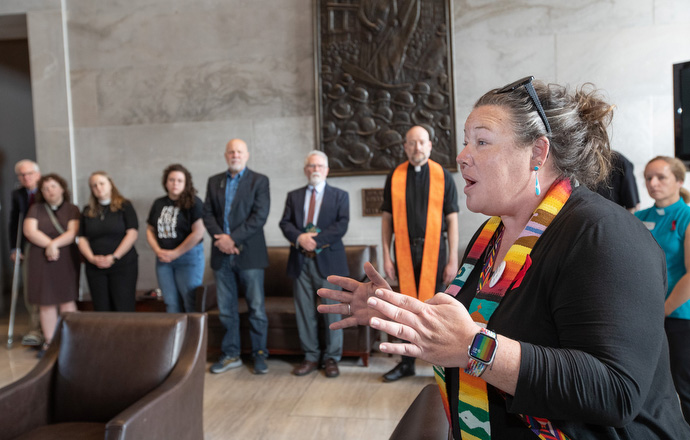
United Methodists have long looked for ways to stop gun violence in all its forms. The denomination’s Book of Resolutions encourages congregations to advocate for such measures as universal background checks for all gun purchases and bans on large-capacity ammunition magazines and weapons designed to fire multiple rounds each time the trigger is pulled, as were used in the Covenant School shooting.
The ecumenical group of clergy at the Tennessee State Capitol also were advocating for those measures. They also support the state instituting a “red flag” law to prevent people from purchasing weapons if they are under a restraining order or suffering from a mental disorder that might cause them to harm themselves or others.
The Rev. Jay Voorhees, lead pastor at City Road Chapel United Methodist Church in Madison, Tennessee, said it’s time to speak out.
“The legislature doesn't want to hear, so we’re going to try to help them listen,” he said.
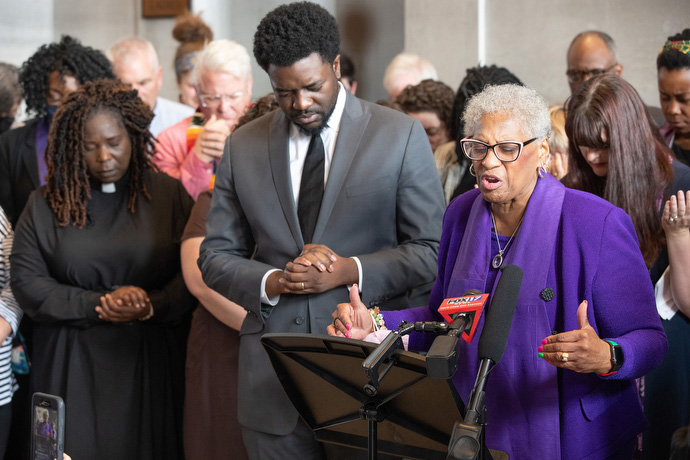
Among those at the press conference was African Methodist Episcopal Bishop E. Anne Henning Byfield, who leads AME Church members in Tennessee and Kentucky. She gave the closing prayer for the press conference.
“We pray in the name of Jesus that we leave this place in power,” she prayed, “to confront, to vote, to speak, to rend, and to end this attack on the people of Tennessee.”
Hahn is assistant news editor for UM News. Contact her at (615) 742-5470 or newsdesk@umcom.org. To read more United Methodist news, subscribe to the free Daily or Friday Digests.




